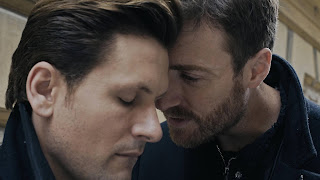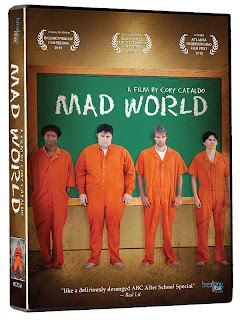TV Review - The Thing About Harry
Here, Paige who directs and co-writes with Joshua Senter takes the idea of bisexuality and again plays it as a bit of a triangle where one man is caught between a man and a woman. Except, this narrative involves what's known as pansexual. Pansexual people are very similar to bisexual people. With the expansion of gender identities and many people in the LGBTQ community expressing themselves in ways that aren't either the binary of male or female, masculine or feminine, some think that pansexual is a more inclusive term than bisexual. Beyond the politeness of seemingly including non-binary or people of other gender identities, Paige's film doesn't really explore the material difference between a pansexual person and a bisexual person, not that there is one, as depicted here.
Jake Borelli (Station 19 and Grey's Anatomy) stars as Sam Basilli, a college student in Chicago who is working for a progressive, mayoral candidate as a community organizer. He has a "Will & Grace" relationship with a fellow student named Stasia. He just broke up with a long-term boyfriend who cheated on him. We never meet this boyfriend, but he's one who has a profound effect on Sam. When Sam is invited to the engagement party of his high school friends, he decides to go, but his high school friends ask him to give a ride to another college student who's also been invited to the engagement party. It ends up being a high school bully who picked on Sam and who Sam didn't like.This is the first contrivance of the film. Sam's friends seem to know that this guy bullied Sam in high school. The bully doesn't have a car, whereas Sam does have a car, so that's why the friends ask Sam to give the bully a ride, but, if they knew about Sam's bullying, it seems odd why they simply wouldn't ask the bully to ride the bus or take a train. The journey is nine-hours by car, so the bully could have even taken a plane. Also, it's assumed that Sam and his bully go to the same college or university, so it's odd that they've never run into each other or been aware of each other until what is conceivably their final year.
Niko Terho co-stars as Harry Turpin, the aforementioned bully. He's in college studying business and marketing. At first, he comes off as a bit of a bro, a frat boy type, a guy who seems to be there only to party and have sex. He's supposed to be not as uptight or as ambitious as Sam, but his impression when he joins Sam on the road trip to the engagement party is one that he's not just relaxed but he also just doesn't give a crap about anyone else besides himself.Because this is a romantic comedy, obviously he has to overcome that crappy behavior, which he does. Terho's performance is at times sincere and charming. He's also very good-looking, but the film has blindspots when it comes to their relationship and certain interactions, as well as more contrivances for the convenience of the plot. For example, during the road trip, Sam and Harry do seem to make a connection that could be romantic, but it's dashed when Harry reconnects with his ex-girlfriend, Lydia. We briefly see Lydia but we don't hear from her, and there's no real explanation from Harry about what happened there.
Allegedly, Harry texted Sam perhaps to explain the Lydia situation. Except, we don't know what the text message said or if he provided any context or details. The film skips over time but doesn't do much to fill in the gaps about Harry and Sam's personal lives. It's like the film doesn't really want to connect the dots. The film skips some time and then all of a sudden, Sam is in a relationship with or is dating Paul, played by Karamo Brown (Queer Eye and The Real World). There's no context or details for how they met or what the attraction is. It also ends so quickly between them that the whole thing felt contrived, if only to have conflict in that one particular scene. That scene involves Paul taking Sam to a trivia night where Harry just so happens to be. It's a totally contrived scene to begin with, so the fact that it would have a contrived conflict is probably appropriate. Given how big the city of Chicago is, it's just seems silly that Sam and Harry would run into each other at some random bar and not on the campus of the school, which they both attend.When Harry asks Sam if they could be together and Sam shoots him down, Harry goes and hooks up with Sam's best friend, Stasia Cooper, played by Britt Baron (GLOW and Grey's Anatomy). The film then tries to reconcile why Stasia would do that to her best friend, but it doesn't do so with any believability. Again, it just feels like a contrived thing for her to do, if only to drag out the plot and further keep Sam and Harry apart. Later, Sam starts dating other guys and he meets what could be considered the perfect guy, an even better guy than Harry, but Sam doesn't pursue a relationship with him, again for a very contrived and quite frankly dumb reason.
Plus, I don't think the film explores what would be the most logical avenue. Sam ended his relationship with his previous boyfriend because he cheated on Sam. Sam's apprehension to hook up with Harry is due to his perception that Harry might cheat or be slutty, given that he's pansexual. Harry doesn't want to live up to that cliché. Yet, ultimately, he does live up to that cliché or the idea that he runs from a relationship the moment it gets a little tough or challenging. The film tries to give Harry a nice speech at the end, but it isn't exactly enough to overcome that cliché perception or why his relationship with Sam would be any different from his with Lydia.Rated TV-14.
Running Time: 1 hr. and 25 mins.
Available on Freeform.















Comments
Post a Comment